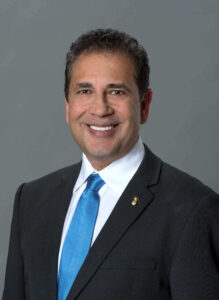
Minesh Mehta, MD


Dr. Minesh Mehta is an internationally recognized leader in radiation oncology, proton therapy, and cancer research. He is the Deputy Director and Chief of Radiation Oncology of Miami Cancer Institute at Baptist Health South Florida in Miami, Florida, where he provides expert care for patients diagnosed with malignant pleural mesothelioma, lung cancer, brain cancer, and other serious malignancies. He is also the chair of the Department of Radiation Oncology and Professor of Radiation Oncology at the Herbert Wertheim College of Medicine.[1]
Education and Career
Dr. Mehta graduated from the University of Zambia School of Medicine and completed his residency at the University of Wisconsin, where he was chief resident in Radiation Oncology.
Dr. Mehta’s career has included leadership of the University of Wisconsin’s Comprehensive Cancer Center’s Imaging and Radiation Sciences Program, leadership of a program project grant in radiation oncology, and having been the chair of the RTOG/NRG oncology’s brain tumor committee. He was also the chairman of the University of Wisconsin School of Medicine and Public Health’s Department of Human Oncology, where he led numerous research studies, innovative technological innovation and implementation, and substantial practice expansion of the University of Wisconsin Cancer Center Clinical Operations.[1]
Following his experience in Wisconsin, Dr. Mehta launched the mid-Atlantic’s first dedicated pencil-beam proton treatment center at the University of Maryland, where he served as Medical Director of the Proton Treatment Center as well as associate director of clinical research at the University of Maryland School of Medicine’s Department of Radiation Oncology.[1]
Research
Dr. Mehta’s research interests include clinical trials, proton therapy, radiosensitizers, radioprotectors, and radiation oncology.[2] He Has led numerous national and international clinical studies, receiving NIH and NCI grants and winning honors for his research in brain and central nervous system tumors. He has over a thousand publications, including medical journal manuscripts, book chapters, and professional abstracts, and serves on the editorial board of several peer-reviewed journals.[1]
His recent publications include:[2]
How proton therapy fits into the management of adult intracranial tumors. Article. Mar 2024. Rupesh Kotecha, Alonso La Rosa, Minesh P Mehta. Intracranial tumors include a challenging array of primary and secondary parenchymal and extra-axial tumors which cause neurologic morbidity consequential to location, disease extent, and proximity to critical neurologic structures. Radiotherapy can be used in the definitive, adjuvant, or salvage setting either with curative or palliative intent. P…
Clinical application of an institutional fractionated stereotactic radiosurgery (FSRS) program for brain metastases delivered with MRIdianⓇ BrainTx™. Article, Mar 2024. Alonso La Rosa, Kathryn E Mittauer, Nema Bassiri[…], Rupesh Kotecha
In Reply to Halperin. Article. Feb 2024. C. Leland Rogers, Sarah K. Lageman, James Fontanesi[…], Timothy J. Harris, Trifiletti et al.. Article. Feb 2024. Rupesh Kotecha, Minesh P Mehta
Accelerated Hypofractionated Magnetic Resonance Guided Adaptive Radiation Therapy for Ultracentral Lung Tumors. Article. Full-text available. Jan 2024. Alonso La Rosa, Kathryn Elizabeth Mittauer, Nema Bassiri[…], Rupesh Kotecha. Radiotherapy for ultracentral lung tumors represents a treatment challenge, considering the high rates of high-grade treatment-related toxicities with stereotactic body radiation therapy (SBRT) or hypofractionated schedules. Accelerated hypofractionated magnetic resonance-guided adaptive radiation therapy (MRgART) emerged as a potential game-changer…
Prophylactic Radiotherapy Of Minimally Symptomatic Spinal Disease (PROMISSeD): study protocol for a randomized controlled trial. Article. Full-text available. Jan 2024. Robert Rothrock, Ahmad Ozair, Maria C. Avendano[…], Rupesh R. Kotecha. Background Early palliative/pre-emptive intervention improves clinical outcomes and quality of life for patients with metastatic cancer. A previous signal-seeking randomized controlled trial (RCT) demonstrated that early upfront radiotherapy to asymptomatic or minimally symptomatic high-risk osseous metastases led to a reduction in skeletal-related e…

Terri Heimann Oppenheimer
WriterTerri Oppenheimer has been writing about mesothelioma and asbestos topics for over ten years. She has a degree in English from the College of William and Mary. Terri’s experience as the head writer of our Mesothelioma.net news blog gives her a wealth of knowledge which she brings to all Mesothelioma.net articles she authors.

Dave Foster
Page EditorDave has been a mesothelioma Patient Advocate for over 10 years. He consistently attends all major national and international mesothelioma meetings. In doing so, he is able to stay on top of the latest treatments, clinical trials, and research results. He also personally meets with mesothelioma patients and their families and connects them with the best medical specialists and legal representatives available.
References
- Baptist Health. Physician Resources. (N.D.). Mines Mehta, MD.
Retrieved from: https://physicianresources.baptisthealth.net/participant/minesh-mehta-md